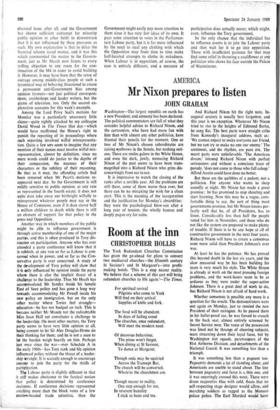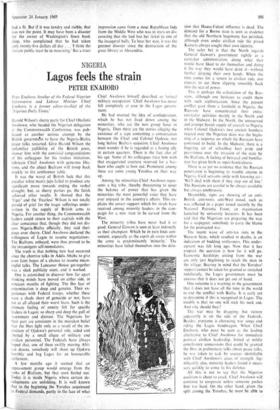Mr Nixon prepares to listen
AMERICA JOHN GRAHAM
Washington—The largest republic on earth has a new President, and amnesty has been declared. The political commentators are full of what they consider helpful advice to Richard Nixon, and the cartoonists, who have had more fun with him than with almost any other politician, have blunted their pencils for the moment. One or two of Mr Nixon's chosen subordinates are raising eyebrows in the Senate, but nothing seri- ous. There are smiles galore in the White House, and even the dark, jowly, menacing Richard Nixon of the past seems to have been trans- mogrified into a Richard Nixon who grins dis- concertingly from ear to ear.
It is impressive to watch the closing of the ranks after a terrible year. All the problems are still there, some of them worse than ever, but there can be no mistaking the wish for a clean start. This is the meaning of the inauguration and the justification for Monday's absurdities: they were the psychological blow-out after a long year of tension, the wholly human and deeply pagan cry for calm. And Richard Nixon hit the right note. In- augural oratory is usually best forgotten, and this year is no exception. Whenever Mr Nixon tried to rise to the heights of Edmund Burke, he sang flat. The best parts were straight cribs from Kennedy's inaugural address, such as : `We cannot expect to make everyone our friend, but we can try to make no one our enemy.' The sentiment, and the rhythm, are pure wx. The worst parts were unbelievable. 'The American dream,' intoned Richard Nixon with perfect seriousness and without a conscious trace of parody,'`does not come to those who fall asleep.' Alfred Austin could have done no better.
But these are the quibbles of a pedant, not a politician. For anyone who wants to sleep soundly at night, Mr Nixon has made a great promise: he has promised to stop shouting and start listening. Now this may be a vague, com- fortable thing to say, the sort of thing most governments promise, but Mr Nixon knows per- fectly well that he, of all Presidents, has to listen. Considecably less than half the people voted for him in November, and those who do not like the system are prepared to make plenty of trouble. If there is to be any hope at all of constructive government in the next four years, Richard Nixon will have to create a consensus even more solid than President Johnson's ever was.
At least he has the patience. He has proved this beyond doubt in the last six years, and the slow measured way he has been building his team is very much his style. The White House is already at work on the most pressing foreign problems, and the work-hours seem to be as arduous as they were under the super-active Johnson. There is a great deal of work to do, but Richard Nixon is not afraid of hard work.
Whether consensus is possible any more is a question for the oracle. The demonstrators were out again on Monday, just to remind the new President of their existwice. As he passed them in his bullet-proof car, he was forced to crouch in the back seat, almost entirely screened by Secret Service men. The route of the procession was lined not by throngs of cheering subjects, tears streaming down their loyal faces, but by Washington riot squads, paratroopers of the 81st Airborne Division, and detachments of the National Guard. It was something less than a triumph.
It was something less than a pageant too. Pageantry demands a lot of standing about, and Americans are unable to stand about. The line between pageantry and farce is a thin one, and it was unerringly crossed this week. There were drum majorettes blue with cold, floats that no self-respecting stage designer would allow, and marching soldiers as ragged as the Monaco palace police. The Earl Marshal would have had a fit. But if it was tawdry and risible, that was not the point. It may have been a disaster for the owner of Washington's finest book shop, who complained that he had taken only twenty-five dollars all day ... 'I think the literate public must be in mourning.' But a truer impression came from a stout Republican lady from the Middle West who was in tears on dis- covering that she had lost her ticket to one of the inaugural balls. To hear h‘er woe, it was the greatest disaster since the destruction of the great library at Alexandria.



































 Previous page
Previous page